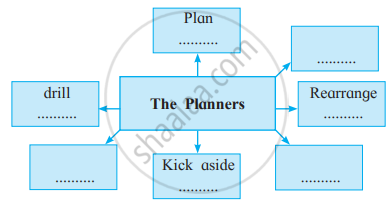Advertisements
Advertisements
प्रश्न
Read the poem and complete the web about the activities the planners do.

उत्तर
The Planners
- Plan and build.
- Grid all the spaces and fill them with permutations of possibilities.
- Rearrange buildings with roads that meet at desired points.
- Kick aside useless blocks with dental dexterity.
- Erase the flaws and blemishes of the past.
- Drill right through the fossils of the last century.
- Pile non-stop.
APPEARS IN
संबंधित प्रश्न
Read the passage carefully.
1. I remember my childhood as being generally happy and can recall experiencing some of the most carefree times of my life. But I can also remember, even more vividly, moments of being deeply frightened. As a child, I was truly terrified of the dark and getting lost. These fears were very real and caused me some extremely uncomfortable moments.
2. Maybe it was the strange way things looked and sounded in my familiar room at night that scared me so much. There was never total darkness, but a street light or passing car lights made clothes hung over a chair take on the shape of an unknown beast. Out of the corner of my eye, I saw curtains move when there was no breeze. A tiny creak in the floor would sound a hundred times louder than in the daylight and my imagination would take over, creating burglars and monsters. Darkness always made me feel helpless. My heart would pound and I would lie very still so that 'the enemy' wouldn't discover me.
3. Another childhood fear of mine was that I would get lost, especially on the way home from school. Every morning, I got on the school bus right near my home ‒ that was no problem. After school, though, when all the buses were lined up along the curve, I was terrified that I would get on the wrong one and be taken to some unfamiliar neighbourhood. I would scan the bus for the faces of my friends, make sure that the bus driver was the same one that had been there in the morning, and even then ask the others over and over again to be sure I was in the right bus. On school or family trips to an amusement park or a museum, I wouldn't let the leaders out of my sight. And of course, I was never very adventurous when it came to taking walks or hikes because I would go only where I was sure I would never get lost.
4. Perhaps, one of the worst fears I had as a child was that of not being liked or accepted by others. First of all, I was quite shy. Secondly, I worried constantly about my looks, thinking people wouldn't like me because I was too fat or wore braces. I tried to wear 'the right clothes' and had intense arguments with my mother over the importance of wearing flats instead of saddled shoes to school. Being popular was very important to me then and the fear of not being liked was a powerful one.
5. One of the processes of evolving from a child to an adult is being able to recognise and overcome our fears. I have learnt that darkness does not have to take on a life of its own, that others can help me when I am lost and that friendliness and sincerity will encourage people to like me. Understanding the things that scared us as children helps to cope with our lives as adults.
(a) On the basis of your reading of the above passage, make notes using headings and subheadings. Use recognizable abbreviations wherever necessary.
(b) Make a summary of the passage in not more than 80 words using the notes made and also suggest a suitable title.
Read the follow ing extract and answer the questions given below:
Not gold but only men can make
A people great and strong;
Men who for truth and honor's sake
Stand fast and suffer long.
Brave men who work while others sleep,
Who dare while others fly...
They build a nation's pillars deep
And lift them to the sky.
(1) What makes a nation strong?
(2) According to you, what makes India a strong and powerful nation?.
(3) Write down the rhyme scheme used in the extract.
(4) What does the phrase 'others fly ... ' mean?
Read the following extract of the poem and complete the activities given below :
B1 State which of the following statements are
True or False :
(i) The elderly are nearest to our own exalted personality.
(ii) The elderly are those persons whose growth is stunted.
(iii) We should know our elderly people well, in order to receive guidance.
(iv) The elderly hold on to the frivolous aspects of life.
Elderly people should be around us. Justify.
(b) abb
(c) abba
Have you known someone like the author’s grandmother? Do you feel the same sense of loss with regard to someone whom you have loved and lost?
How would you say ‘a dilapidated drum’ in your language?
Number the points.
What do you understand of Einstein’s nature from his conversations with his history teacher, his mathematics teacher and the head teacher?
Nouveau riche and bourgeoise are French words. Collect from newspapers, magazines, and other sources some more French words or expressions that are commonly used in English.
Make a list of the expressions that imbue the watch with human attributes.
Why does Russell call the three passions 'simple'?
Discuss the following in pairs or in small groups.
Kumudini Lakhia's life is an inspiring illustration of the emancipation of women.
Name the world-famous personality who reached great heights despite of humble circumstances.

Answer in your own words.
How did the plants react to the fast rhythmic music?
Say why the speaker of the poem wishes to be a-
hawker
Answer in your own words.
Read and write down 5 points which prove that Tomba, (Lanthoi’s father) firmly believes in gender equality.
State whether the following statement is True or False. Correct the false statement by finding evidence from the poem to support your remark.
Birds and insects were benefitted from the tree.
Answer the given question in your own words.
Why was the Prince sad?
Think and answer in your own words.
'Beauty' in stanza 5 to 6 can refer to a beautiful maiden as well as nature itself. Explain when and how nature ‘dances’ and also 'smiles'.
Given below are various professions in column A and in column B, the nature of work in respective professions. Match the columns.
| A | B |
| (i) Anaesthetist | (a) Specialist in the treatment of problems concerning the position of teeth and jaws. |
| (ii) Pharmacist | (b) A person who designs buildings and supervises the process of constructing them. |
| (iii) Orthodentist | (c) A person who is in charge of a newspaper or of a part of a newspaper. |
| (iv) Dermitologist | (d) The medical study of the skin and its diseases. |
| (v) Architect | (e) A person who has been trained to prepare medicines and sell them to the public. |
| (vi) Chartered Accountant | (f) A person whose job is to give drugs which makes the person not feel pain especially in preparation for a medical operation. |
| (vii) Editor | (g) A person who is engaged in the profession of accounting and examining the statements and records of accounts. |
Read the first and second stanza of the poem. We understand that the poet wants to suggest the powerful dominance of the planners who shape the town according to their selfish desires. Make a list of such expressions. You may begin with -
- All the spaces are gridded, filled with permutations of possibilities.
- ________________________________
- ________________________________
- ________________________________
Expand the idea inherent in the following proverb :
If winter comes, can spring be far behind? - Shelley
Read the description of the Kabaddi match and do the following:
Write, in your own words, what happened in the second half.
Read the passage and answer the following question:
What makes Indra’s vajra or weapon invincible?
Describe the following with the help of the story.
Thiruvalluvar
Comment on the given statement after reading the given dialogue -
I wouldn’t be in your shoes if he rewards me ten times as much. People generally fall victim to incentives. Some people stick to values. They _________________.
Discuss the following question after you have seen a presentation of the ‘ad’.
What would happen if you never ate fruits and vegetables?
The wheel, which was probably invented more than 6000 years ago, is thought of as one of the greatest technological advances made by man. Why do you think the wheel is so important in human civilization?
Imagine you are visiting the Science Fair. What other stalls (apart from the ones mentioned here) are you likely to find there? Try to list at least five more stalls.
Using your imagination, and information from other sources, describe anyone stalls in detail.
Find the meaning of the following word.
thee
Write the following:
The sights mentioned in the third stanza.
We find the following in the script of a skit or play. Rearrange these steps in the proper order and write them down in the form of a flow chart.

Complete the following diagram.

Describe the following in one or two lines.
The world around the bird’s nest.
Find the meaning of the following word.
adorning
Tell any one of the stories orally imagining you are Gulliver.
What is meant by being ‘offline’?
Why did Mrs. Jhunjhunwalla buy the painting?
What do you infer about speaking with others from this poem?
Read the lines and answer the questions.
There are many legends based on their heroic exploits
a legacy of tales which have been told with much adroit
- What does ‘heroic exploits’ mean?
- What are legends?
Did he hire Kiouni? Why?
Identify the speaker/character.
Wake up, child.
Fill in the table given below.
| S. No | Problems faced by the hatchlings | Effect | Solution |
| 1. | Pollution | Survival of sea turtles becomes difficult. | Reduce the usage of plastics. |
| 2. | Predators | ||
| 3. | Human Activities |
A sea turtle camouflages its nest by tossing sand on it to ______.
Why did the farmer have to travel far?
Work in pair, find answer for the question and share in the class.
Which word refers to ‘rain’?.
How did the second daughter use the grain?
A ________ dies for the nation.
Put the given time expressions in the correct columns.
| winter | morning | 2’ o clock | evening | 1947 |
| March | Sunday | 15th August | 4.30 PM | wedding day |
| in | at | on |
Read scene I of the play carefully and answer the question below.
Who is about to go on a hunt? Do the wolves panic on his arrival? Explain.
Match their hobbies.
 |
swimming |
 |
cycling |
 |
gardening |
Match the following.
| 1. | garden | very small |
| 2. | trash can | hungry and tired |
| 3. | old man | well maintained |
| 4. | hut | earthen pot |
| 5. | gruel | wasted food |
Identify the character or the speaker.
“I was cruel and selfish.”
Circle and write the adverbs.
We will leave today. ______
What did Kani realize in the story?
Which quality makes 'world is one and human is one'?
Mugund did not cut the raw wood.
A person who overcomes problems, will get ______ at the end.
What does the earth do when the day is over?
